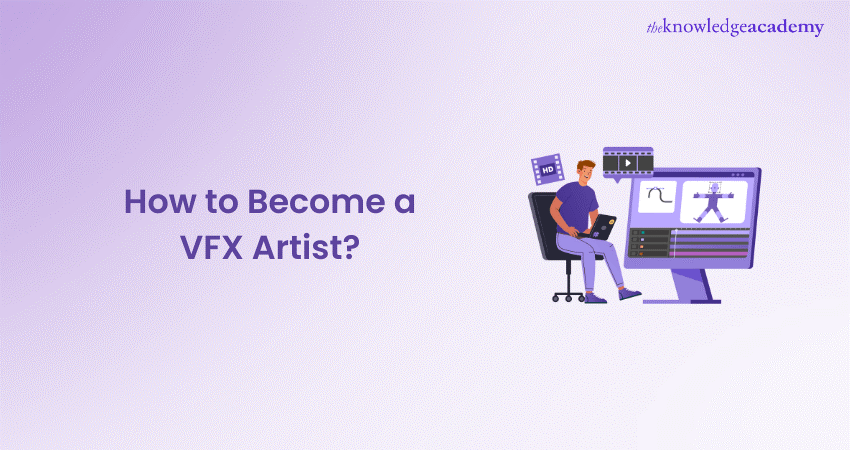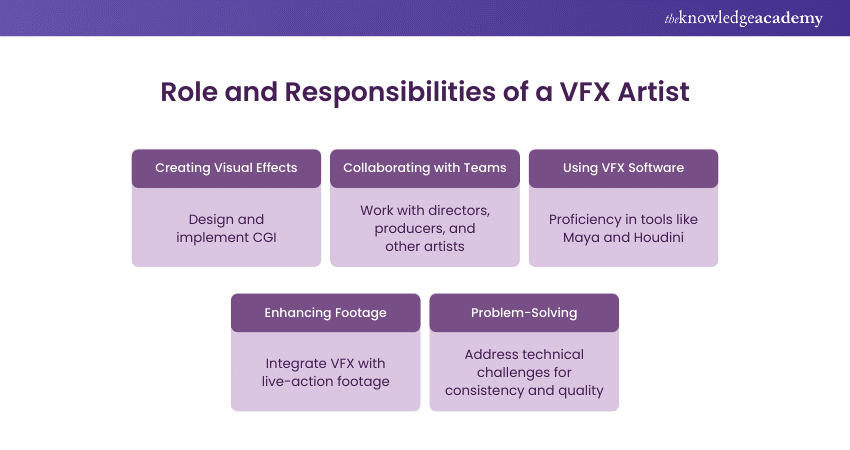We may not have the course you’re looking for. If you enquire or give us a call on 01344203999 and speak to our training experts, we may still be able to help with your training requirements.
Training Outcomes Within Your Budget!
We ensure quality, budget-alignment, and timely delivery by our expert instructors.

Captivated by the awe-inspiring visuals in your favorite movies and ever wondered How to Become a VFX Artist yourself? You're not alone! The world of VFX is a fascinating blend of creativity and technical expertise, offering a chance to bring imagination to life on the silver screen.
But where do you begin? How to Become a VFX Artist can feel like a daunting question. The good news is, with the right guidance and dedication, this dream career can be within your reach. This comprehensive guide will be your roadmap to success in the exciting world of VFX.
Table of Contents
1) Who is a VFX Artist?
2) How to Become a VFX Artist?
3) Key Skills for VFX Artists
4) Understanding the Role and Responsibilities of a VFX Artist
5) Career Growth and Opportunities in the VFX Industry
6) Conclusion
Who is a VFX Artist?
A VFX Artist, also known as a Visual Effects Artist, plays a crucial role in crafting the visual imagery for film and television. Utilising advanced computer software, these artists generate animations and special effects that enhance the authenticity of cinematic productions. Often referred to as multimedia artists or animators, their responsibilities can vary based on their particular position and the studio employing them. VFX Artists are sought after by production companies of various scales to bolster their creative endeavors in video content.
How to Become a VFX Artist?
To become a visual effects (VFX) artist, the key steps are:
1) Obtain Your Diploma
Although certain employers may hire candidates without a high school diploma, possessing one generally improves employment opportunities. Earning a high school diploma provides a basic educational groundwork that can facilitate the attainment of a desirable job. Moreover, some roles may require a college degree, particularly in visual arts or similar disciplines. Acquiring a diploma or an equivalent qualification is typically a preliminary step towards higher education.
2) Cultivate Your Skills
During your educational journey, prioritise skill enhancement. Allocate regular periods for artistic practice and acquaint yourself with the latest technological tools. If you have proficiency in video animation software, make it a staple of your practice regimen. Embrace further educational pursuits such as online courses and workshops to broaden and deepen your abilities.
3) Consider Higher Education
Securing a place in a university course may provide you with an advantage in the employment arena. It's advisable to opt for a course with a strong focus on VFX, animation, and media skills, which are pivotal for a career in Visual Effects. Bear in mind that certain positions may stipulate a degree as a requirement, so it's important to be aware of the educational criteria for different roles within the VFX industry.
4) Seek Out Internship Opportunities
Internships provide essential practical experience throughout your university studies. Take advantage of your university's careers office to find pertinent internships. Where possible, seek out a mentor to help steer you through the VFX landscape and facilitate introductions to industry experts. Not only do internships improve your competencies, but they also strengthen your CV, paving the way for prospective permanent positions.
5) Specialise in Your Field
Numerous VFX Artists excel by focusing on particular animation styles or media types. As you progress in honing your abilities and academic background, contemplate carving out a niche in an area that aligns with your interests. Mastery in a specialised field can elevate your profile, making you a prominent contender for positions in that specialty.
6) Explore Freelancing
Freelancing serves as an effective pathway to gain experience in the field of Visual Effects. By taking on freelance assignments that span various styles and mediums, you can discover your passions and sharpen both your creative and technical skills. Additionally, freelancing enriches your portfolio, improving your chances for securing long-term employment opportunities.
7) Scan Available Positions
Investigate job openings for Visual Effects Artists in your chosen specialty and beyond. Keeping an open mind about your job choices can expand your opportunities in the VFX industry. Carefully examine the criteria for each position and think about obtaining extra qualifications that could be beneficial. Systematise your research with organisational tools such as spreadsheets or listing apps to keep track of your progress.
8) Assemble Your Portfolio and Apply
Construct a bespoke CV and covering letter that highlight your expertise in Visual Effects. Personalise these documents for every position you pursue, integrating relevant keywords from the job descriptions to optimise for Applicant Tracking Systems (ATS) that some firms utilise. Investigate the objectives of each organisation and illustrate in your application how your talents correspond with their ambitions.
Key Skills for VFX Artists
VFX Artists require a diverse skill set to excel in their complex and creative roles. Here’s a refined list of skills beneficial for a VFX Artist:
a) Drawing: Fundamental to VFX, drawing skills aid in animation creation and conceptual sketches.
b) Visual Aesthetics: A keen sense of aesthetics is crucial for crafting visually appealing content, considering color, shape, and design.
c) Composition and Lighting: Proficiency in lighting and composition is essential for producing captivating animations and effects frame by frame.
d) Photography: A background in photography can greatly enhance a VFX Artist’s ability to visualise and create effects.
e) Sculpture and Anatomy: Knowledge of anatomy and sculpture aids in bringing realistic movement and form to characters and objects.
f) Mechanics of Movement: Understanding the physics of movement complements anatomical knowledge, enabling more lifelike animations.
g) Critical Thinking: The ability to critically assess and adapt to evolving VFX workflows is vital.
h) Creativity: Imagination is at the heart of VFX, enabling the creation of memorable Visual Effects.
i) Communication: Effective communication is key when collaborating with teams and conveying ideas.
j) Project Management: Skills in managing projects, from team coordination to logistical planning, are indispensable for leading VFX projects.
Learn how to make logic to decide the behaviour of your epic game with our Unreal Engine 4 Game Development Training – Join today!
Understanding the Role and Responsibilities of a VFX Artist

A VFX Artist is a specialist in crafting Visual Effects for the entertainment industry, including films, TV series, and video games. They employ CGI to generate scenes, characters, and items that are challenging to film in reality.
Their duties encompass the creation and execution of top-tier Visual Effects, teaming up with filmmakers and fellow artists, often within stringent deadlines. Staying abreast of new software and technological advancements is crucial for their role.
The job of a VFX Artist also involves innovating and applying new methods to address intricate visual challenges, ensuring the outcomes are in harmony with the director's concept. Understanding the diverse responsibilities of a VFX Artist is essential for anyone aspiring to enter this field.
Career Growth and Opportunities in the VFX Industry
Understanding the spectrum of career paths is crucial for aspiring VFX designers. The VFX sector encompasses diverse positions such as compositors, 3D modellers, animators, and VFX supervisors, each demanding a unique skill set and offering distinct prospects for career progression.
The field is ever-changing, presenting perpetual opportunities for learning and professional growth. With accrued experience, one can ascend to senior roles like lead artist or VFX supervisor, which entail significant responsibilities, including project management and team leadership.
Adaptability and a commitment to skill enhancement are key to unlocking new possibilities across various industries, from cinema and television to gaming and virtual reality (VR). With an increasing demand for proficient VFX Artists, the career outlook in this domain is optimistic.
Understand how to create visuals in Pygame with our Python Game Development Training with Pygame – join today!
Conclusion
Now you've unlocked the secrets behind a VFX Artist's toolkit! With this knowledge, you're well-equipped to navigate the exciting path of How to Become a VFX Artist. So, hone your skills, embrace your creativity, and get ready to transform imagination into cinematic reality!
Learn how to track motion and match moving to integrate graphics with our VFX Visual Effects Training – join today!
Frequently Asked Questions

Getting into VFX can be challenging due to the competitive nature of the industry. It requires a strong portfolio, proficiency in VFX software, and often a degree or specialised training. Persistence and networking are crucial for success.

Drawing skills can be beneficial for VFX, especially for creating concepts and storyboards. However, they are not strictly necessary. Proficiency in VFX software, creativity, and understanding visual storytelling are more critical for a successful career in VFX.

The Knowledge Academy takes global learning to new heights, offering over 30,000 online courses across 490+ locations in 220 countries. This expansive reach ensures accessibility and convenience for learners worldwide.
Alongside our diverse Online Course Catalogue, encompassing 17 major categories, we go the extra mile by providing a plethora of free educational Online Resources like News updates, Blogs, videos, webinars, and interview questions. Tailoring learning experiences further, professionals can maximise value with customisable Course Bundles of TKA.

The Knowledge Academy’s Knowledge Pass, a prepaid voucher, adds another layer of flexibility, allowing course bookings over a 12-month period. Join us on a journey where education knows no bounds.

The Knowledge Academy offers various Game Development Training, including the VFX Visual Effects Training, Unreal Engine 4 Game Development Training and Python Game Development Training with Pygame. These courses cater to different skill levels, providing comprehensive insights into Game Development Process.
Our Programming & DevOps Blogs cover a range of topics related to Visual Effects, offering valuable resources, best practices, and industry insights. Whether you are a beginner or looking to advance your Video Editing skills, The Knowledge Academy's diverse courses and informative blogs have got you covered.







 Top Rated Course
Top Rated Course




 If you wish to make any changes to your course, please
If you wish to make any changes to your course, please


